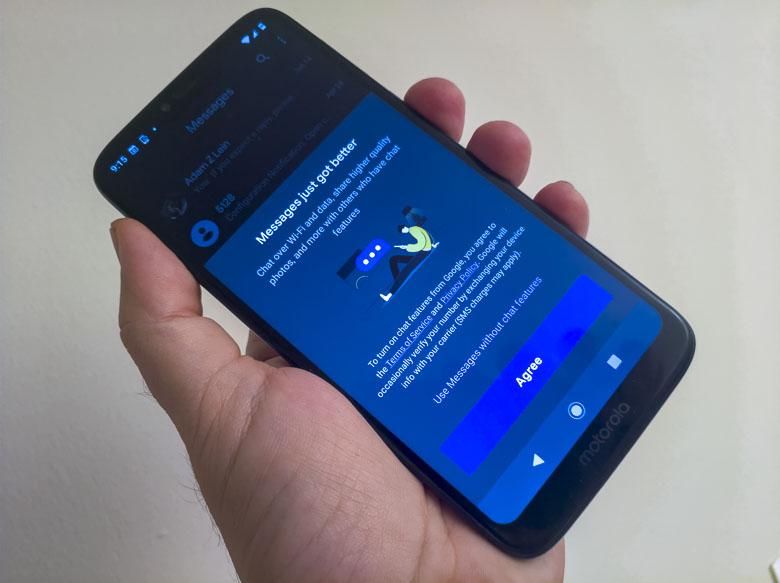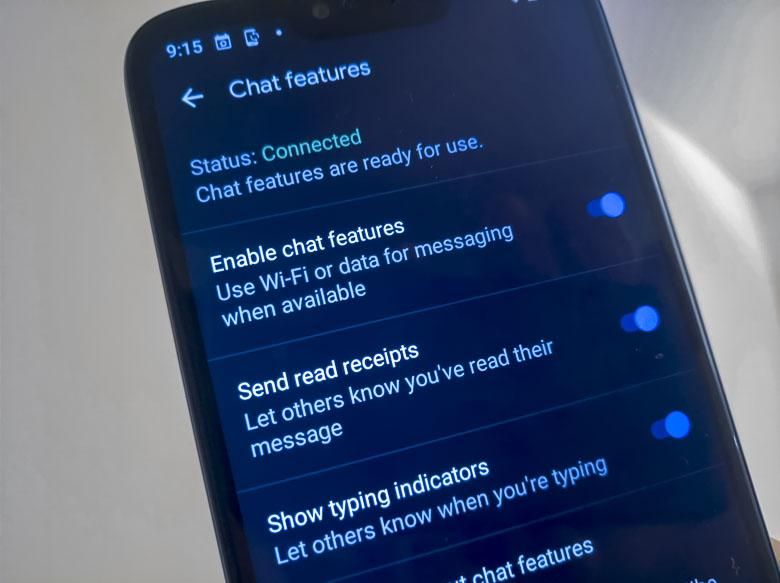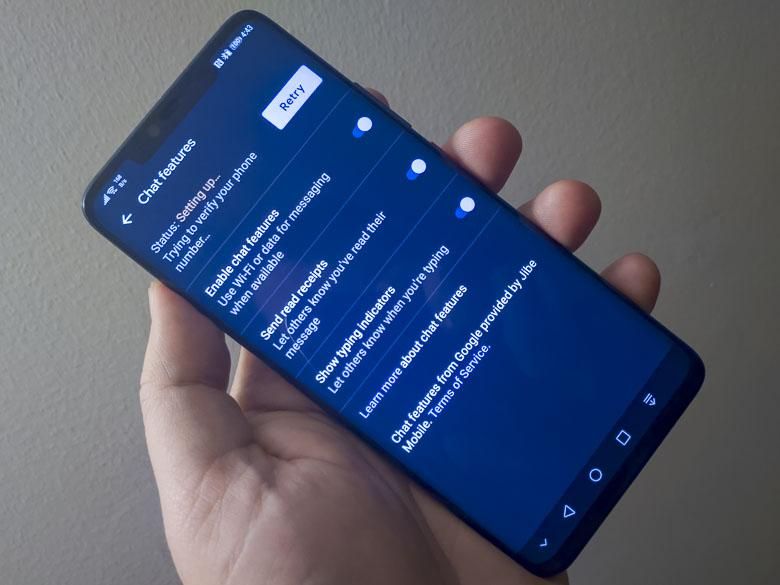The text messaging systems that people use on their phones today have been pretty awful for a while. They started as SMS which was a hack to sneak text-based data into the signaling connections of cell phones in the 90’s. Multimedia Messaging System was added to that as another hack that required a data connection and allowed sending really low resolution images and videos. The archaic system is ripe for replacement, especially in the age of the internet. Actually, in the age of the internet, phone-number based messaging should probably just be replaced with domain name server message routing like the internet was made for, but we’ll get to that later.
Google has been trying to get carriers to upgrade to a new system of electronic messaging called rich communications system or RCS since before they gave up on most of Google’s other terrible electronic messaging systems. Google is focused on RCS now and has been building it into the default text messaging app on Android.
How it works
By now, most U.S. based Android phones with Google’s default messaging app should have a new preference to enable chat features. This switch will send your phone number to Google’s servers and register it as a chat-capable account, which is to say it will enable RCS (Rich Communications System). After that, text messages will be sent through the internet (via Google’s Jibe servers) instead of piggy-backing on your cell phone’s connection signal. This will enable advanced features like high resolution image attachments, video attachments, read receipts, and typing indicators. You know, the things that all other internet messaging systems are capable of. You will be able to turn off the read receipts and typing indicators if you want.
Do you like Freedom?
If you do like freedom, you’re probably not going to want to use RCS for a number of reasons.
It still uses your phone number
First of all, RCS chat messaging is tied to your phone number which puts a dependency on your phone company that really isn’t necessary (or secure) in the age of the internet. See “Why are we still using phone numbers?” If you haven’t noticed, phone numbers are very easy to guess for spam bot machines that simply dial numbers and play recordings in order to try to scam you. It’s impossible for you to create a more-secure phone number that’s less guess-able like you can with email addresses or usernames. Furthermore, changing numbers usually gets you a recycled phone number that someone else had previously and is probably already compromised by spam bots.
It doesn’t work on other devices
Having RCS tied to your phone number means it’s also tied to whichever phone that number is activated on. That means you can’t use it on other devices without some hacky work-arounds that probably route your data through 3rd party servers and still require an active account with a phone company. Compare this to open internet messaging standards like email, internet relay chat, XMPP or the Matrix protocol where you can log-in from any internet connection on any internet enabled device (or devices) and you’ll see that RCS chat is severely limiting your freedom of choice among and between devices.
The messages don’t sync between devices either. So even if you switch your phone number’s activation to another device, the messages from your previous device won’t sync over. Yeah, that’s something we could do with email since IMAP servers existed in the previous century.
Your messages go through Google
Google has specifically stopped using the “Don’t be evil” motto so that they can allow themselves to be evil now. This change of direction has been noticeable as well. Many of Google’s products don’t respect users privacy anymore. Here are a few: (1) (2) (3) (4) (5). Even basic search results have started being modified allegedly in order to manipulate users (6). It’s probably safe to say that routing your personal or business communications through Google’s servers is not going to give you any serious privacy. Google may not actually censor you or share your info with other agencies on purpose, but they certainly could, and that’s a risk to your freedom.
And then there’s Google’s awful track record when it comes to supporting messaging apps for any extended amount of time.
https://twitter.com/Foone/status/1195407880939159552?ref_src=twsrc%5Etfw
No Encryption
Text messaging never had end-to-end encryption and the upgrade to RCS won’t enable that capability either. It’s not even possible. Most other internet based electronic chat apps and services can enable end-to-end encryption with proprietary means and thus don’t allow other services to federate. RCS just doesn’t even try to provide security and privacy for its users.
You can’t make your own server
One of the big indicators of technology that supports freedom and longevity is whether or not you have the ability to really own your data. The best way to do that is to make your own server that you have full control over. All of the other actually open messaging standards on the internet allow this. I can make my own email server and communicate with anyone else on the internet with very little cost or effort (and a bit more know-how). You could do it with a $40 Raspberry Pi, an internet connection, and a free DDNS service. The same is true with the other open standards like XMPP, IRC, Matrix, etc. Even if you don’t want to build your own server, this open-protocol structure allows you to choose from many different providers so that you might find one that you can trust. This open structure also allows you to easily switch providers if/when you become unhappy with your current provider.
None of that is at all possible with RCS, SMS, or MMS messaging. Those systems require an established phone company with proprietary phone company hardware… thus, again, severely limiting your freedom. These are all run by big corporations that really don’t care if you can trust them or not as long as you’re giving them money. It’s a bit anti-competitive and anti-consumer.
Import/Export tools
Besides the ability to make your own server, another big indicator of technology freedom is whether or not your data can be imported or exported to other programs or services. With email, I can transfer all of my conversations over the past 25 years or so into practically any email program out there.
With Google’s Android implementation of RCS… importing or exporting messages is severely limited (non-existent.) That’s a big clue that you’re going to run into problems down the road, since any conversations you may have won’t be transferable to other phones in the future.
It won’t work with Apple products
Apple has successfully hijacked text messaging on iPhones by enabling the use of their proprietary “iMessage” app and service by default. This works similarly to RCS in that your phone number is registered on Apple’s servers as supporting iMessage and then all iPhones who are registered as iMessages users route their messages through Apple’s servers. The key difference here is that the messages go through Apple’s servers not Google’s servers and Apple probably won’t federate with RCS any time soon or ever… Where as Google does intend to federate with other RCS implementations for cross-service communications.
So Apple users in iMessage will still have compatibility issues with Android users in Google Messages and vice versa. Both of these systems were designed to lock users in, so neither are likely going to collaborate willingly.
It will probably break when you switch phones
If you’re a smartphone enthusiast, you probably like to switch phones fairly frequently. I sometimes switch my SIM card into different phones depending on where I’m going that day. RCS will give you the same problems that iMessage has when you switch devices. If you have some conversations using RCS on Android and then you switch your phone’s activation SIM card into an iPhone or any other type of phone, the Google RCS servers will still think you’re using RCS and any messages sent to you will probably not be delivered. The same thing happens if you use iMessage on an iPhone… when you switch to a different phone, Apple will still think you’re using iMessage and any message sent to you will not be delivered. You have to remember to specifically de-activate the RCS or iMessage features every time you switch which is obviously another annoyance.
https://twitter.com/RJ_McKenzie/status/1222526840239161350?ref_src=twsrc%5Etfw
Phone companies are going to make their own version of RCS
The top 4 wireless phone companies in the U.S.A. have decided to band together to create their own implementation of RCS as part of the CCMI (Cross Carrier Messaging Initiative). (1) The results of this will probably be yet another messaging app.
https://twitter.com/arnehess/status/1222495962935054336?ref_src=twsrc%5Etfw
What we need is a democratic protocol for messaging
Maybe someday society will realize that we don’t need big corporations to make decisions for us regarding how we communicate. We’ve got the internet now, which is a great equalizer.
Anyone who can plug a cheap Raspberry Pi into a router and follow a few instructions can make their own internet messaging service. Here are some XMPP chat server instructions, Internet Relay chat instructions, and Matrix Synapse server instructions. Those will work for as long as you have electricity and internet connected to your servers. No need to depend on a phone company or giant software corporation! What’s more is that these free open-source messaging protocol servers can work with other servers that use the same protocol. That means you don’t have to pressure people you know into installing proprietary apps or making accounts on your server. They can make their own server and talk to you, or make their own account on a different server and talk to you. The amount of technological freedom is very very high here.
Or if you want to use an open protocol that’s already the most widely used messaging protocol in the world with about 4 billion users, can and has been upgraded many times, and isn’t controlled by anybody… that messaging protocol is email and it is fully capable of handling practically all of the things you might think can only be done in other chat apps. You probably already have at least one email account since it’s required just to use any iPhone, Android phone, Mac, or Windows PC. If you want to change how it works, there is literally nothing stopping you.
How many segregated anti-freedom messaging services do you really need? The answer should be none.



